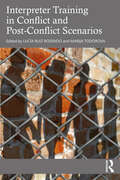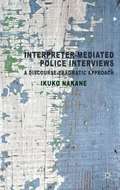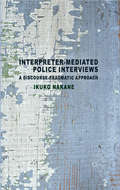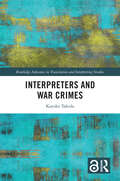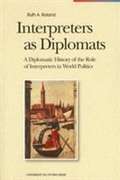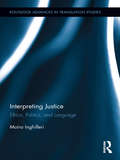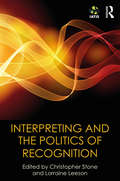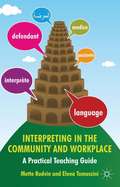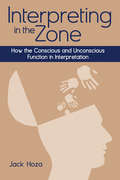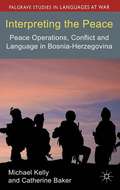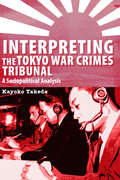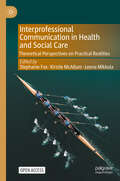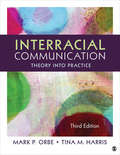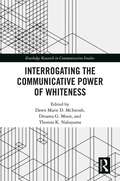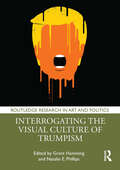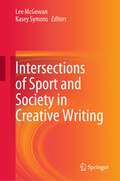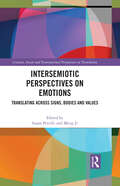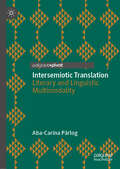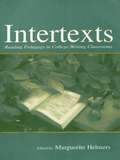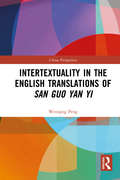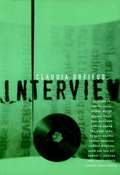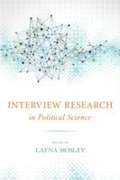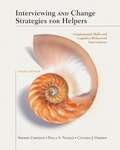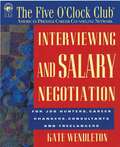- Table View
- List View
Interpreter Training in Conflict and Post-Conflict Scenarios
by Marija Todorova Lucía Ruiz RosendoThe role of interpreters in conflict situations is of increasing real world importance. There are ethical, cultural and professional issues that have yet to be explored and there is a need for specialised training that addresses the specific contexts in which interpreters perform their duties, considering the situated nature of interpreting in these contexts. This volume is structured around interpreter training in different contexts of conflict and post-conflict, from military operations and international tribunals to asylum-seeking and refugee, humanitarian and human rights missions. Themes covered include risk management and communication, ethics and professional demeanour, language technology and its use, intercultural mediation, training in specific contexts, such as conflict resolution and negotiation, and working with trauma. Chapters are authored by experts from around the world with a range of different profiles: military personnel, scholars, the staff of international organisations, and representatives from refugee and asylum-seeker-assisting institutions. Interpreter Training in Conflict and Post-Conflict Scenarios is key reading both for students and scholars researching interpreting in conflict zones and conflict-related scenarios and for practising and trainee interpreters and mediators working for international organisations and the military.
Interpreter-mediated Police Interviews
by Ikuko NakaneThis book shows how the participation of interpreters as mediators changes the dynamics of police interviews, particularly with regard to power struggles and competing versions of events. Employing a range of approaches including conversation analysis, interactional sociolinguistics and legal narrative theory, Interpreter-mediated Police Interviews provides a detailed study of the impact of interpreter mediation on this area of the justice system. It reveals how turn-by-turn decisions of communication by all three participants, including the interpreter, affect the trajectory of the institutional discourse. By providing a better understanding of police interview discourse and exploring the practical implications of interpreter participation, this book contributes to the improvement of interpreter-mediated investigative interviews and will be of great interest to legal professionals as well as interpreters and their trainers.
Interpreter-mediated Police Interviews: A Discourse-Pragmatic Approach
by I. NakaneThis book shows how participation of interpreters as mediators changes the dynamics of police interviews, particularly with regard to power struggles and competing versions of events. The analysis of interaction offers insights into language in the legal process.
Interpreters and War Crimes (Routledge Advances in Translation and Interpreting Studies)
by Kayoko TakedaTaking an interdisciplinary approach, this book raises new questions and provides different perspectives on the roles, responsibilities, ethics and protection of interpreters in war while investigating the substance and agents of Japanese war crimes and legal aspects of interpreters’ taking part in war crimes. Informed by studies on interpreter ethics in conflict, historical studies of Japanese war crimes and legal discussion on individual liability in war crimes, Takeda provides a detailed description and analysis of the 39 interpreter defendants and interpreters as witnesses of war crimes at British military trials against the Japanese in the aftermath of the Pacific War, and tackles ethical and legal issues of various risks faced by interpreters in violent conflict. The book first discusses the backgrounds, recruitment and wartime activities of the accused interpreters at British military trials in addition to the charges they faced, the defence arguments and the verdicts they received at the trials, with attention to why so many of the accused were Taiwanese and foreign-born Japanese. Takeda provides a contextualized discussion, focusing on the Japanese military’s specific linguistic needs in its occupied areas in Southeast Asia and the attributes of interpreters who could meet such needs. In the theoretical examination of the issues that emerge, the focus is placed on interpreters’ proximity to danger, visibility and perceived authorship of speech, legal responsibility in war crimes and ethical issues in testifying as eyewitnesses of criminal acts in violent hostilities. Takeda critically examines prior literature on the roles of interpreters in conflict and ethical concerns such as interpreter neutrality and confidentiality, drawing on legal discussion of the ineffectiveness of the superior orders defence and modes of individual liability in war crimes. The book seeks to promote intersectoral discussion on how interpreters can be protected from exposure to manifestly unlawful acts such as torture.
Interpreters as Diplomats: A Diplomatic History of the Role of Interpreters in World Politics
by Ruth A. RolandThis book looks at the role played throughout history by translators and interpreters in international relations. It considers how political linguistics function and have functioned throughout history.
Interpreting Justice: Ethics, Politics and Language (Routledge Advances in Translation and Interpreting Studies)
by Moira InghilleriIn this timely study, Inghilleri examines the interface between ethics, language, and politics during acts of interpreting, with reference to two particular sites of transnational conflict: the political and judicial context of asylum adjudication and the geo-political context of war. The book characterizes the social and moral spaces in which the translation of the spoken word occurs in ways that reflect the realities of the trans-nationally constituted, locally and globally informed environments in which interpreters work alongside others. One of the core arguments is that the rather restricted notion of neutrality that remains central to translator and interpreter practices does not adequately reflect the complex and paradoxical nature of these socially and politically inscribed encounters and others like them. This study offers an alternative theoretical perspective on language and ethics to those which have shaped and informed translation and interpreting theory and practice in recent years.
Interpreting and the Politics of Recognition: The IATIS Yearbook (The IATIS Yearbook)
by Christopher Stone Lorraine LeesonInterpreting and the Politics of Recognition investigates the historical, ethical and professional dimensions of this, arguably, most widespread form of intercultural communication. Covering key topics from colonialism to representation, ethics and power, it looks at the different linguistic modalities (signed and spoken) used within communities to investigate equality of citizens. The contributors include leading authorities in their fields and use a wide spread of examples from a variety of disparate cultures – including deaf and ethnic minority groups. With eight chapters presented in three thematic sections and a foreword by Michael Cronin setting the book in its wider context, this volume will be of interest to practising interpreters, researchers and advanced students in the areas of Interpreting Studies, Translation Studies, and Linguistics and Communication Studies. Additional resources for Translation and Interpreting Studies are available on the Routledge Translation Studies Portal: http://cw.routledge.com/textbooks/translationstudies.
Interpreting in the Community and Workplace
by Mette Rudvin Elena TomassiniAn innovative and comprehensive guide that can be applied to a wide range of dialogue settings this educational tool for trainers in all fields of dialogue interpreting addresses not only the two key areas of Community- and Public Service Interpreting, the legal and health sectors, but also business interpreting.
Interpreting in the Zone: How the Conscious and Unconscious Function in Interpretation
by Jack HozaSuccessful interpretation can feel seamless, an intuitive and efficient translation of meaning from one signed or spoken language to another. Yet the process of interpretation is actually quite complex and relies upon myriad components ranging from preparation to experience to honed judgment. Interpreting in the zone, instinctively and confidently, is an energizing, encompassing experience that results in great satisfaction and top performance--but what does it take to get there? Jack Hoza's newest research examines the components that enable interpreters to perform successfully, looking at literature in interpretation, cognitive science, education, psychology, and neuroscience, as well as reviewing the results of two qualitative studies he conducted. He seeks to uncover what it means to interpret in the zone by understanding exactly how the brain works in interpretation scenarios. He explores a range of dichotomies that influence interpretation outcomes, such as: Intuition vs. rational thought Left brain vs. right brain Explicit vs. implicit learning Novice vs. master Spoken vs. signed languages Emotion vs. reasoning Cognitive processes such as perception, short-term memory, and reflexivity are strong factors in driving successful interpretation and are explored along with habits, behaviors, and learned strategies that can help or hinder interpretation skills. Hoza also considers the importance of professional development and collaboration with other practitioners in order to continually hone expertise. Interpreting in the Zone shows that cognitive research can help us better understand the intricacies of the interpreting process and has implications for how to approach the interpreting task. This resource will be of value to both the interpreter-in-training as well as the seasoned practitioner.
Interpreting the Peace
by Michael Kelly Catherine BakerAnalysing the issues of language that faced international forces carrying out peace operations in Bosnia-Herzegovina in the 1990s, this book examines how differences of language were an integral part of the conflicts in the country and in what way the multinational UN and NATO forces faced their own problems of communication and language support.
Interpreting the Tokyo War Crimes Tribunal: A Sociopolitical Analysis (Perspectives on Translation)
by Kayoko TakedaIn order to ensure its absolute authority, the Tokyo War Crimes Tribunal (1946–1948), the Japanese counterpart of the Nuremberg Trial, adopted a three-tier structure for its interpreting: Japanese nationals interpreted the proceedings, second-generation Japanese-Americans monitored the interpreting, and Caucasian U.S. military officers arbitrated the disputes. The first extensive study on the subject in English, this book explores the historical and political contexts of the trial as well as the social and cultural backgrounds of the linguists through trial transcripts in English and Japanese, archival documents and recordings, and interviews with those who were involved in the interpreting. In addition to a detailed account of the interpreting, the book examines the reasons for the three-tier system, how the interpreting procedures were established over the course of the trial, and the unique difficulties faced by the Japanese-American monitors. This original case study of the Tokyo War Crimes Tribunal illuminates how complex issues such as trust, power, control and race affect interpreting at international tribunals in times of conflict.
Interprofessional Communication in Health and Social Care: Theoretical Perspectives on Practical Realities
by Stephanie Fox Leena Mikkola Kirstie McAllumThis is an Open Access book. Interprofessional communication remains both under-theorized and under-researched in healthcare contexts. This book aims to fill that gap by offering practitioners, policy makers, interprofessional curriculum builders, and students in the health professions a broadened theoretical understanding and rich empirical examples of interprofessional communication across a range of health and social care contexts. Importantly, this means opening the black box of what it means for interprofessional collaboration to be “effective,” in particular, for complex, collective practices that rely on shared meanings and accountabilities. Divided into three parts, the book brings together the practical and conceptual expertise of scholars and practitioners from the fields of communication, interprofessional education, health and human sciences, and healthcare management.
Interracial Communication: Theory Into Practice
by Mark P. Orbe Tina M. HarrisInterracial Communication: Theory Into Practice, Third Edition, by Mark P. Orbe and Tina M. Harris, guides readers in applying the contributions of recent communication theory to improving everyday communication among the races. The authors offer a comprehensive, practical foundation for dialogue on interracial communication, as well as a resource that stimulates thinking and encourages readers to become active participants in dialogue across racial barriers. Part I provides a foundation for studying interracial communication and includes chapters on the history of race and racial categories, the importance of language, the development of racial and cultural identities, and current and classical theoretical approaches. Part II applies this information to interracial communication practices in specific, everyday contexts, including friendships, romantic relationships, the mass media, and organizational, public, and group settings. This Third Edition includes the latest data, new research studies and examples, all-new photos, and important new topics.
Interrogating the Communicative Power of Whiteness (Routledge Research in Communication Studies)
by Thomas K. Nakayama Dawn Marie McIntosh Dreama G. MoonThe field of communication offers the study of whiteness a focus on discourse which directs its attention to the everyday experiences of whiteness through regimes of truth, embodied acts, and the deconstruction of mediated texts. This book takes an intersectional approach to whiteness studies, researching whiteness through rhetorical analysis, qualitative research, performance studies, and interpretive research. More specifically the chapters deconstruct the communicative power of whiteness in the context of the United States, but with discussion of the implications of this power internationally, by taking on relevant and current topics such as terrorism, post-colonial challenges, white fragility at the national level, the emergence of colorblind discourse as a pro-white discursive strategy, the relationship of people of color with and through whiteness, as well as multifaceted identities that intersect with whiteness, including religion, masculinity and femininity, social class, ability, and sexuality.
Interrogating the Visual Culture of Trumpism (Routledge Research in Art and Politics)
by Grant Hamming Natalie E. PhillipsBringing together scholars from art history, visual studies, and related disciplines, this edited volume asks why Trumpism looks the way it does and what that look means for American—and global—society.Grouped into six categories, the essays in this volume tackle some of the most perplexing—and urgent—aspects of the Trumpist visual project. Two of the most striking aspects of that project are its use of novel commodity forms, including the iconic red baseball caps, as well as its embrace of social media. Trump’s outlandish persona and striking physicality have lent themselves to caricature both from his critics and, perhaps more surprisingly, his supporters. That physicality—as well as his movement’s hearkening back to a (mostly imagined) era of mid-twentieth-century prosperity—has also brought gender and the body into sharp focus. Perhaps second only to the aforementioned red hat is Trumpism’s vigorous use of interventions into public space, including traditional campaign signs as well as flags and other ad hoc visual and architectural materials. Finally, there were the events of January 6, 2021, when many of Trumpism’s most outré visual and cultural preoccupations exploded from the shadows onto television screens across the country. Taken as a whole, the essays in this book examine Trumpist visuality from the seemingly trivial to the starkly horrifying, as well as offering a measured sense of the various resistances and responses that have characterized artistic responses to Trump from the beginning of his prominence.The book will be of interest to scholars working in art history, visual culture, American studies, and cultural and media studies.
Intersections of Sport and Society in Creative Writing
by Lee McGowan Kasey SymonsThis edited collection is positioned at the nexus of sports, society and creative writing. In its explorations of the intersections of sports writing, analysis of literary contributions and examinations of craft, it offers rare consideration of a rich diversity of form in narratives that occur in, and as creative practice. Included in the collection are dynamic academic investigations into football writing and poetry focused on community sporting activities in Afghanistan, to those addressing the intersections of writing and boxing in the reflexive reclamation of the post-trauma self, the absence of women in the rodeo and who and what is represented in our sports shelves. This book breaks new ground in approaches to sport’s role in creative writing and what creative writing can provide in furthering our understanding of sport in society. The works in this edited book draw on a diverse range of methods to interrogate the processes, concepts and liminal spaces through an intersectional array of voices, offering analysis and insight into the application of creative writing knowledge and practice in relation to sport and its impact on wider discipline discussion and research. It is relevant to students and scholars studying and researching creative writing, sports writing, sports studies, cultural studies and sports media studies.
Intersemiotic Perspectives on Emotions: Translating across Signs, Bodies and Values (Creative, Social and Transnational Perspectives on Translation)
by Susan PetrilliThis edited volume explores emotion and its translations through the global world from a variety of different perspectives, as a personal, socio-cultural, ideological, political, and even business investment in the latest phases of globalisation. Emotions are powerful in engaging or disengaging individuals, communities, the masses, peoples and nations with distinct linguistic and cultural backgrounds for good, but especially for evil. All depends on how emotions are interpreted, that is translated in "words" or in "facts", in any case in "signs". Semiotic reflection on emotions and their interpretation/translation is thus of essential importance. An adequate understanding of emotional phenomena and their complexities calls for different views which together reveal and illustrate inconsistencies in our modern life. The contributors argue that an investigation of types of emotional translation – linguistic and non-linguistic, audio-visual, theatrical, literary, racial, legal, architectural, political, and so forth – can contribute to a better understanding of emotions and how they are exploited to engender injustice, unfairness, absurdity in contemporary life. However, emotions can also be exploited and oriented – and this is the intent of our authors – to favour the development of sustainable multicultural societies and facilitate living together. A fantastic reference for students and scholars in translation, semiotics, language and cultural studies around the world.
Intersemiotic Translation: Literary and Linguistic Multimodality
by Aba-Carina PârlogThis book explores the practical aspects of intersemiotic translation, examining how different signs and sign sets can be transposed into different kinds of semiotic forms of reference. Drawing on theories from translation studies, semiotics, philosophy and stylistics, the author seeks to understand what happens when texts are translated from one genre or modality to another, and makes use of examples ranging from written texts to advertising, images, music, painting, photography, and sculpture. She also analyses related topics such as the differences between Romance and Germanic languages, the difficulties that arise when attempts are made to translate figures of speech or elements of authorial style, and how this interdisciplinary field relates to traditional language-based translation. This book will be of interest to students, teachers, translators and researchers working in the fields of translation studies and multimodality in particular.
Intertexts: Reading Pedagogy in College Writing Classrooms
by Marguerite HelmersWhat do we mean when we talk about reading? What does it mean to "teach reading?" What place does reading have in the college writing classroom? Intertexts: Reading Pedagogy in College Writing Classrooms theoretically and practically situates the teaching of reading as a common pedagogical practice in the college writing classroom. As a whole, the book argues for rethinking the separation of reading and writing within the first-year writing classroom--for an expanded notion of reading that is based on finding and creating meaning from a variety of symbolic forms, not just print-based texts but also other forms, such as Web sites and visual images. The chapter authors represent a range of cultural, personal, and rhetorical perspectives, including cultural studies, classical rhetoric, visual rhetoric, electronic literacy, reader response theory, creative writing, and critical theories of literature and literary criticism. This volume, an important contribution to composition studies, is essential reading for researchers, instructors, writing program administrators, and students involved in college writing instruction and literature.
Intertextuality in the English Translations of San Guo Yan Yi (China Perspectives)
by Wenqing PengSan Guo Yan Yi is one of the best-known classic Chinese novels in the English-speaking world. The earliest English translation came out in 1820, while a range of further translations have been produced over the past two hundred years. How do the different versions relate to each other? This volume examines the intertextual relations between the English translations of San Guo Yan Yi. Intertextuality refers to the interdependence of texts in relation to one another. Focusing on the perspectives of impact, quotation, parallels and transformation, the author compares a range of the translated versions, including two full-length translations and over twenty excerpted renderings and partial adaptations since the 1820s. She discovers that excerpted translations are selected to fit the translators’ own narrations, and are adapted to many genres, such as poetry, drama, fairytales, and textbooks. Moreover, the original text, translated texts and other related English works are interconnected in one large network, for which intertextuality offers an ideal basis for research. Students and scholars of Chinese literature and translation studies will benefit from this book.
Interview
by Claudia DreifusThe interview is the DNA of journalism, the nucleus from which all life flows. Newspaper and magazine writers draw vital information, and sometimes inspiration, from government documents or corporate memos. These days, many journalists are chained to their computers, surfing the Internet for material. But it's all lifeless data without an interview, without going out to learn what real people think. Even if the reporter does nothing more than put a quick clarifying question to an expert on the phone, he is conducting an interview. And how he has thought out that question and worded it can spell the difference between producing something people will want to read or toss aside.
Interview Research In Political Science
by Layna MosleyInterviews are a frequent and important part of empirical research in political science, but graduate programs rarely offer discipline-specific training in selecting interviewees, conducting interviews, and using the data thus collected. Interview Research in Political Science addresses this vital need, offering hard-won advice for both graduate students and faculty members. The contributors to this book have worked in a variety of field locations and settings and have interviewed a wide array of informants, from government officials to members of rebel movements and victims of wartime violence, from lobbyists and corporate executives to workers and trade unionists. The authors encourage scholars from all subfields of political science to use interviews in their research, and they provide a set of lessons and tools for doing so. The book addresses how to construct a sample of interviewees; how to collect and report interview data; and how to address ethical considerations and the Institutional Review Board process. Other chapters discuss how to link interview-based evidence with causal claims; how to use proxy interviews or an interpreter to improve access; and how to structure interview questions. A useful appendix contains examples of consent documents, semistructured interview prompts, and interview protocols. Contributors: Frank R. Baumgartner, The University of North Carolina at Chapel Hill; Matthew N. Beckmann, University of California, Irvine; Jeffrey M. Berry, Tufts University; Erik Bleich, Middlebury College; Sarah M. Brooks, The Ohio State University; Melani Cammett, Brown University; Lee Ann Fujii, University of Toronto; Mary Gallagher, University of Michigan; Richard L. Hall, University of Michigan; Marie Hojnacki, Pennsylvania State University; David C. Kimball, University of Missouri, St. Louis; Beth L. Leech, Rutgers, the State University of New Jersey; Julia F. Lynch, University of Pennsylvania; Cathie Jo Martin, Boston University; Lauren Maclean, Indiana University; Layna Mosley, The University of North Carolina at Chapel Hill; Robert Pekkanen, University of Washington; William Reno, Northwestern University; Reuel R. Rogers, Northwestern University
Interviewing And Change Strategies For Helpers: Fundamental Skills And Cognitive Behavioral Interventions
by Sherry Cormier Cynthia J. Osborn Paula S. NuriusThis respected text skillfully combines evidence-based interviewing skills and cognitive-behavioral intervention change strategies applicable to a wide range of client ages, cultural backgrounds, and problems in living. The book interweaves attention to conceptual and empirical foundations with an emphasis on practical skills and real-life factors in contemporary settings with diverse clientele. Long commended for its synthesis of up-to-date professional knowledge with case models, learning activities, and guided feedback, INTERVIEWING AND CHANGE STRATEGIES FOR HELPERS: FUNDAMENTAL SKILLS AND COGNITIVE BEHAVIORAL INTERVENTIONS, Sixth Edition, features a new streamlined and reader-friendly design, as well as essential new information on vital topics such as ethics, critical thinking, client resistance, exposure therapy, the helping relationship, and recent developments in cognitive behavior therapy. These valuable additions complement a proven instructional format focusing on essential knowledge, skills, values, and tools needed by today's professional helpers.
Interviewing And Salary Negotiation
by Kate WendletonINTERVIEWING AND SALARY NEGOTIATION will help you: Meet with the right people...Beat the competition...and Negotiate the best salary-whether you're looking for $20,000 or $500,000. You got the interview; now what do you do? How do you turn that great networking meeting into a job lead? Would you like to get the most by mastering the "Four-Step Salary Negotiation Method"? What's the best way to make sure the job you're offered is the job you really want? INTERVIEWING AND SALARY NEGOTIATION is for every job hunter who wants to ace the interview...to turn that interview into a job offer...and to maximize the salary offer. INTERVIEWING AND SALARY NEGOTIATION teaches you how to: Gain more power in the job interview. Find out who your competitors are and how you stack up. Use the follow-up checklist to turn interviews into offers. Start out on the right foot in your new job. INTERVIEWING AND SALARY NEGOTIATION is based on the highly successful methods used at The Five O'clock Club, America's Premier Career Counseling Network, where the average participant finds a new job in less than 10 weeks. Kate Wendleton, a nationally syndicated careers columnist, is an authority on job search and career development. Kate has been a career coach since 1978 when she founded The Five O'Clock Club to help job hunters, career changers, and consultants at all levels. She is also the founder of Workforce America, a not-for-profit organization serving adult job hunters in Harlem who are not yet in the professional or managerial ranks. A former CEO of two small companies, Kate has twenty years of business experience as well as an MBA.
Interviewing For The Helping Professions: A Comprehensive Relational Approach
by Nicole Nicotera Fred McKenzieA successful professional interview depends on the development of a generally positive human interaction. Without a positive base, the interview can be fraught with difficulties and roadblocks. This is true regardless of the discipline, be it social work, psychology, human services, nursing, criminal justice, medicine, psychiatry, or any other field. Beginning interviewers may have learned solid technique, but often are initially focused more on thinking about what they will say next than on understanding or even listening to the client. As a result, that critical initial interview -- whose success affects the future of most professional encounters -- is often disrupted by a failure to truly listen and understand, which is the foundation for earning clients' trust. This second edition goes beyond most other clinical interviewing books in its emphasis on the emotional foundation of interviewing and its focus on the importance of social justice and attention to the problem of microaggressions that can prohibit building and maintaining therapeutic rapport with clients. Interviewing for the Helping Professions can help both the beginning professional and the veteran interviewer understand the nature and purpose, technique, meaning, emotions, and outcomes of the interviewing process. The book also provides a comprehensive overview of the theory and technique so crucial to meaningful interviewing. More important, it emphasizes the emotional significance of the interaction and grounds the interviewing process in contemporary theories of practice and social justice.
